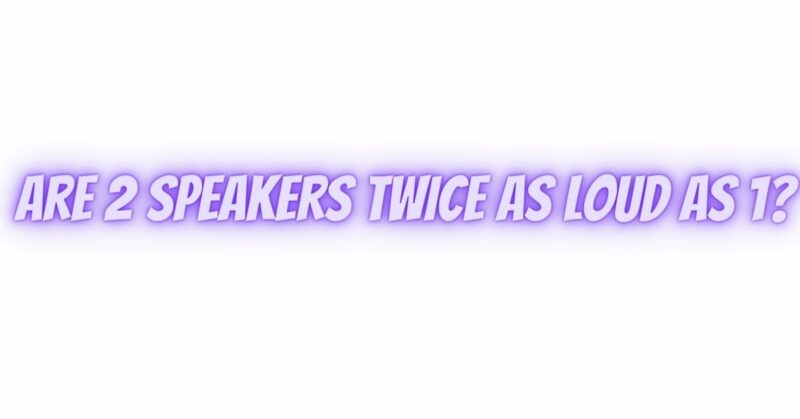When it comes to audio systems, there’s a common misconception that adding a second speaker to a setup will make the sound twice as loud as a single speaker. In reality, the relationship between the number of speakers and perceived loudness is not quite as straightforward as doubling the volume. In this article, we’ll explore the principles behind speaker loudness and why two speakers are not necessarily twice as loud as one.
Understanding Speaker Loudness:
Speaker loudness, often measured in decibels (dB), is a measure of how intense or powerful a sound is. The human perception of loudness is not linear but rather logarithmic. This means that doubling the perceived loudness requires a substantial increase in sound intensity.
The Decibel Scale:
The decibel scale, used to measure sound levels, is logarithmic. A 3 dB increase represents a doubling of acoustic power, and a 10 dB increase roughly corresponds to a perceived doubling of loudness. So, to perceive a sound as being twice as loud, you would need approximately ten times more acoustic power.
The Role of Speaker Power:
One important factor that affects speaker loudness is the power rating of the speakers. Higher-power speakers can produce more sound output than lower-power ones. However, simply adding a second speaker does not automatically double the power or loudness.
How Adding Speakers Affects Loudness:
When you add a second speaker to a system, you do increase the total sound output. However, the loudness increase is not directly proportional to the number of speakers. Here’s why:
- Combining Sound Waves: When two speakers are placed close together and are in phase (meaning they produce sound waves that align), they can reinforce each other, creating a modest increase in loudness. This effect is known as constructive interference.
- Inverse Square Law: Sound follows the inverse square law, which means that as you move away from a sound source, the intensity decreases rapidly. Adding a second speaker may increase the total sound output, but it doesn’t change the rate at which sound intensity diminishes with distance.
- Room Acoustics: The acoustics of the room also play a significant role. Sound waves bounce off walls, floors, and ceilings, creating reflections and influencing perceived loudness. Adding more speakers can affect these reflections, but the results can be complex and may not lead to a simple doubling of loudness.
Speaker Placement and Equalization:
To make the most of multiple speakers in a setup, careful consideration of speaker placement and equalization (adjusting the balance of frequencies) is essential. Properly positioned speakers can provide a more even distribution of sound throughout a room, potentially improving the listening experience.
Conclusion:
In summary, while adding a second speaker can increase the total sound output and improve the coverage of sound in a room, it does not make the sound twice as loud as a single speaker. The perceived loudness depends on factors such as speaker power, sound wave interference, room acoustics, and the distance from the speakers. Doubling the number of speakers is more about coverage and balance than sheer loudness. To achieve significantly greater loudness, you would need a substantial increase in acoustic power, which may involve using more powerful speakers or amplifiers.


